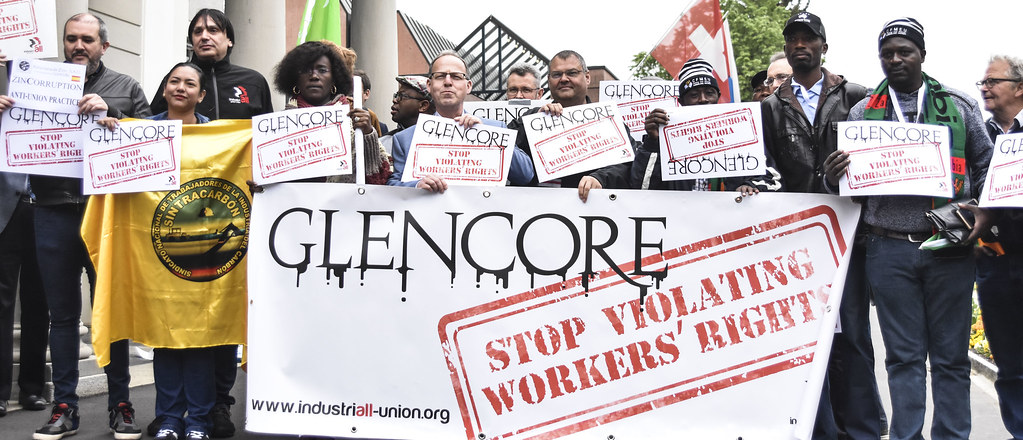3 May, 2018Leaders from unions representing Glencore workers around the world demonstrated outside and inside the company’s annual shareholders meeting in Zug, Switzerland on 2 May, demanding global dialogue to address serious concerns at the company’s operations.
Trade union representatives from Australia, Canada, Colombia, Democratic Republic of Congo, Italy, South Africa, Spain, Switzerland and Zambia demonstrated outside and later attended the meeting. They were joined by representatives of NGOs, who came together to build a blue-green alliance to fight the company.
Speaking outside the meeting, held at a casino on the shores of Lake Zug, IndustriALL Global Union assistant general secretary Kemal Özkan said:
“Glencore gambles with people’s lives and livelihoods. How appropriate that capitalists hold their meeting in a casino! We are here to say that Glencore is rotten to the core.”
“We are outraged, angry and concerned with the practices of Glencore on the ground, with violations of human and trade union rights, bad health and safety conditions, increasing outsourcing and precarious work. We are here to show the real face of the company, rather than the face that the company wants you to see.”
Union leaders gave shareholders a briefing highlighting the labour, social, governance and environmental risks of Glencore’s behaviour, with information not reported in the company’s annual report. For instance, Glencore’s lockout at the Oaky North mine in Australia cost the company $450 million, and abusive and conflictual industrial relations creates conflict which threatens company performance in a way that is not beneficial to shareholders.
The delegation asked a number of uncomfortable questions during the meeting. Pierre Tshinguz of IndustriALL affiliate TUMEC in Democratic Republic of Congo (DRC) raised the abysmal conditions for workers at the Mutanda and Kolwezi mines, while Claudia Blanco of Sintracarbón in Colombia spoke about poor health and safety and the persecution of trade unionists at the Prodeco mine. Claude Kabemba of Southern Africa Resource Watch raised pertinent questions about the extraction of huge amounts of mineral wealth from the region, with very little return to the local community.
In a conversation with the trade union delegation after the meeting, CEO Ivan Glasenberg pledged to organize a joint union-management mission to DRC to investigate the issues raised. IndustriALL previously sent Glencore a report on its mission to DRC, offering a joint mission to improve the situation.
Glencore union network
In the days prior to the meeting, the Glencore union network met in Zurich to coordinate the campaign. Union leaders spoke of their experiences: John Silungwe of the Mineworkers Union of Zambia said that when 4,300 miners were retrenched from the Mopani mine, production targets remained the same, forcing some categories of employees to spend excessive time, sometimes more than 24 hours, underground.
Stephen Smyth, president of Queensland branch of IndustriALL’s Australian affiliate CFMEU Mining & Energy, spoke about the bitter 238 day lockout at Oaky North, which involved company security following the wives and children of union members around town and photographing them.
Common themes emerged from the workers’ testimonies, including environmental degradation, the intimidation of trade union activists, a haphazard approach to health and safety, and Glencore’s frequent claim to not be making any money at its operations.
Speaking about the environment, Pierre Tshinguz said that after toxic chemicals were released at Mutanda, a fish species died out, and others declined dramatically. He expressed concern for local children who wash in the water.
Claudia Blanco also reported that in April, the company released waste water that killed fish. Workers are blamed for accidents, and when they become ill, they are either laid off, or sent to work in terrible conditions at a mine the workers call Guantanamo.
“We will campaign until the company commits to meaningful dialogue to address serious violations across its operations” said Kemal Özkan.










